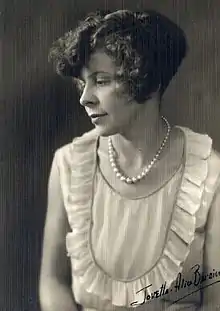Jovette Bernier
Marie-Angèle "Jovette" Alice Bernier (November 27, 1900 – December 4, 1981) was a journalist and writer in Quebec. Because of extensive exposure in the print media and on radio, she was often referred to simply as Jovette.[1]
Jovette-Alice Bernier | |
|---|---|
 | |
| Born | November 27, 1900 |
| Died | December 4, 1981 (aged 81) |
| Nationality | Canadian |
| Occupation(s) | writer journalist |
Biography
The daughter of Joseph-Elzéar Bernier and Élise Morest, she was born in Saint-Fabien-de-Rimouski.[1] She attended the Normal School in Rimouski and went on to teach in the Gaspé region and later Quebec City.[2] Bernier began her career in journalist in 1923 and, over the next 50 years, appeared in print, on radio and on television.[1] She wrote for L'Événement in Quebec city, La Tribune in Sherbrooke and L'Illustration in Montreal.[2] In 1932, she was given a daily show Bonjour madame on radio station CKAC. From 1939 to 1958, Bernier was the host of the radio show Quelles nouvelles , which included sketch comedy. From 1963 to 1965, she wrote scripts for the Quebec soap opera Rue de l'Anse.[3]
Bibliography
- Poetry collections
- Roulades (1924)
- Comme l'oiseau (1926)
- Tout n'est pas dit (1929), which won the Lieutenant-Governor's medal
- les Masques déchirés (1932)
- Mon deuil en rouge (1945)
- Novels
- La chair décevante (1931). La chair décevante from 1931 was seen as scandalously sensual when it was first published.[4] The protagonist is Didi, a young single mother (a social status that was not widely accepted at the time.) The book opens with Didi on vacation at a beach. She meets a man named Jean, and the book describes her appreciating his body with a frankness and explicitness that would be seen as shocking for the time.[4]
- Non Monsieur (1969), which received the Prix du Cercle du livre de France.[2] Non Monsieur from 1969 describes Puce ("Flea"), a woman set apart from traditional society. She is a teacher, who falls madly in love with a Metis man named Noc. As summarized by Ouellet, Beaulieu, and Tremblay,[5] she is acting less for her own liberation as a woman and more as an act of rebellion against her family.
Death and legacy
Bernier died in Longueuil at the age of 81.[1]
Rue Jovette-Bernier in Sherbrooke[2] ,Rue Jovette-Bernier in Montreal and Rue Jovette-Bernier in Quebec City[6] were named in her honour.
An annual literary prize, the Prix Jovette-Bernier (later known as the Prix Jovette-Bernier—Ville de Rimouski), was created in her honour.[3]
Awards
- Lieutenant-Governor's medal
- Prix du Cercle du livre de France
References
- New, William H (2002). Encyclopedia of Literature in Canada. University of Toronto Press. p. 105. ISBN 0802007619.
- "Jovette-Bernier, Rue" (PDF) (in French). City of Sherbrooke. Archived from the original (PDF) on 2014-10-14. Retrieved 2014-10-09.
- "Prix Jovette-Bernier—Ville de Rimouski" (in French). Le Salon du livre de Rimouski. Archived from the original on 2017-02-03. Retrieved 2014-10-09.
- Rannaud, Adrien. "Dire la ferveur de la sensation". Erudit, Voix Et Images. Université du Québec à Montréal. Retrieved 27 July 2017.
- Turgeon, Laurier; Létourneau, Jocelyn; Fall, Khadiyatoulah (1997). Les espaces de l'identité. Montreal: University of Laval University Press. p. 81. ISBN 2763775411. Retrieved 2017-07-27.
- "Jovette-Bernier". Répertoire des toponymes (in French). City of Quebec.